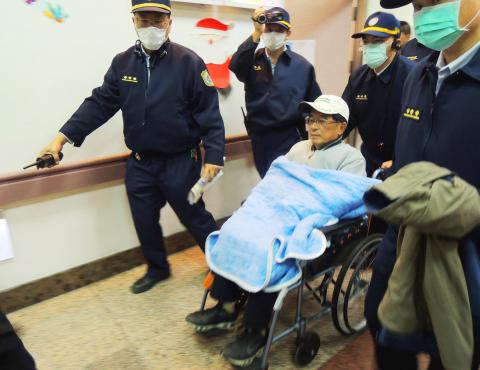The Taiwan High Court yesterday rejected former president Chen Shui-bian’s (陳水扁) application for medical parole, saying his case should be taken up in the administrative court.
The High Court added that the decision could be appealed in the Supreme Court.
The judges said Chen’s parole case relates to his treatment at prison facilities controlled by the Ministry of Justice’s Agency of Corrections, so it comes under the jurisdiction of the administrative authority.

Photo: Tsai Shu-yuan, Taipei Times
Therefore, the case should be taken up at the administrative court and be submitted as administrative litigation, the judges said.
Chen filed a motion of objection to the High Court on Thursday, penning the legal complaint himself, following a suggestion by Minister of Justice Luo Ying-shay (羅瑩雪) on Monday.
The High Court said that under Article 484 of the Criminal Code, a motion of objection can only lodged against the improper execution of duties by prosecutors. The case was not handled by prosecutors and therefore there was no grounds for a motion of objection, the court said.
On June 10, Chen applied for medical parole with the ministry, but the Agency of Corrections rejected his application, ruling that he did not meet the qualifications for medical parole.
The ruling was carried with the stipulation that the decision could be appealed through the courts.
Chen appealed by filing a motion of objection to the Taipei District Court on Nov. 11.
The District Court rejected the motion in a decision on Nov. 26, saying that the case was not within its jurisdiction.
In a press conference on Monday, Luo openly encouraged Chen to file another application for medical parole, saying it had been six months since his initial medical diagnosis for his current parole bid.
Luo said that for the second application, the Agency of Corrections should consider expanding the panel of experts for the review process to include medical professionals and doctors recommended by Chen’s family.
The latest decision by the High Court again denied Chen’s release from prison to serve the rest of his sentence under medical care at home.
Earlier yesterday, Luo said her suggestion was not an attempt to instruct the judiciary on how to handle Chen’s parole case.
“It is a very odd thing that the media are saying that I was giving instructions. The decision [by the Taipei District Court] was clear, where it said the case was in the wrong jurisdiction, and the decision can be appealed,” she said.
Luo added that she does not know how long the medical parole review process will take, and that the panel has not set a position one way or another.

NATIONAL SECURITY THREAT: An official said that Guan Guan’s comments had gone beyond the threshold of free speech, as she advocated for the destruction of the ROC China-born media influencer Guan Guan’s (關關) residency permit has been revoked for repeatedly posting pro-China content that threatens national security, the National Immigration Agency said yesterday. Guan Guan has said many controversial things in her videos posted to Douyin (抖音), including “the red flag will soon be painted all over Taiwan” and “Taiwan is an inseparable part of China,” while expressing hope for expedited “reunification.” The agency received multiple reports alleging that Guan Guan had advocated for armed reunification last year. After investigating, the agency last month issued a notice requiring her to appear and account for her actions. Guan Guan appeared as required,

A Vietnamese migrant worker yesterday won NT$12 million (US$379,627) on a Lunar New Year scratch card in Kaohsiung as part of Taiwan Lottery Co’s (台灣彩券) “NT$12 Million Grand Fortune” (1200萬大吉利) game. The man was the first top-prize winner of the new game launched on Jan. 6 to mark the Lunar New Year. Three Vietnamese migrant workers visited a Taiwan Lottery shop on Xinyue Street in Kaohsiung’s Gangshan District (崗山), a store representative said. The player bought multiple tickets and, after winning nothing, held the final lottery ticket in one hand and rubbed the store’s statue of the Maitreya Buddha’s belly with the other,

‘NATO-PLUS’: ‘Our strategic partners in the Indo-Pacific are facing increasing aggression by the Chinese Communist Party,’ US Representative Rob Wittman said The US House of Representatives on Monday released its version of the Consolidated Appropriations Act, which includes US$1.15 billion to support security cooperation with Taiwan. The omnibus act, covering US$1.2 trillion of spending, allocates US$1 billion for the Taiwan Security Cooperation Initiative, as well as US$150 million for the replacement of defense articles and reimbursement of defense services provided to Taiwan. The fund allocations were based on the US National Defense Authorization Act for fiscal 2026 that was passed by the US Congress last month and authorized up to US$1 billion to the US Defense Security Cooperation Agency in support of the

DAREDEVIL: Honnold said it had always been a dream of his to climb Taipei 101, while a Netflix producer said the skyscraper was ‘a real icon of this country’ US climber Alex Honnold yesterday took on Taiwan’s tallest building, becoming the first person to scale Taipei 101 without a rope, harness or safety net. Hundreds of spectators gathered at the base of the 101-story skyscraper to watch Honnold, 40, embark on his daredevil feat, which was also broadcast live on Netflix. Dressed in a red T-shirt and yellow custom-made climbing shoes, Honnold swiftly moved up the southeast face of the glass and steel building. At one point, he stepped onto a platform midway up to wave down at fans and onlookers who were taking photos. People watching from inside